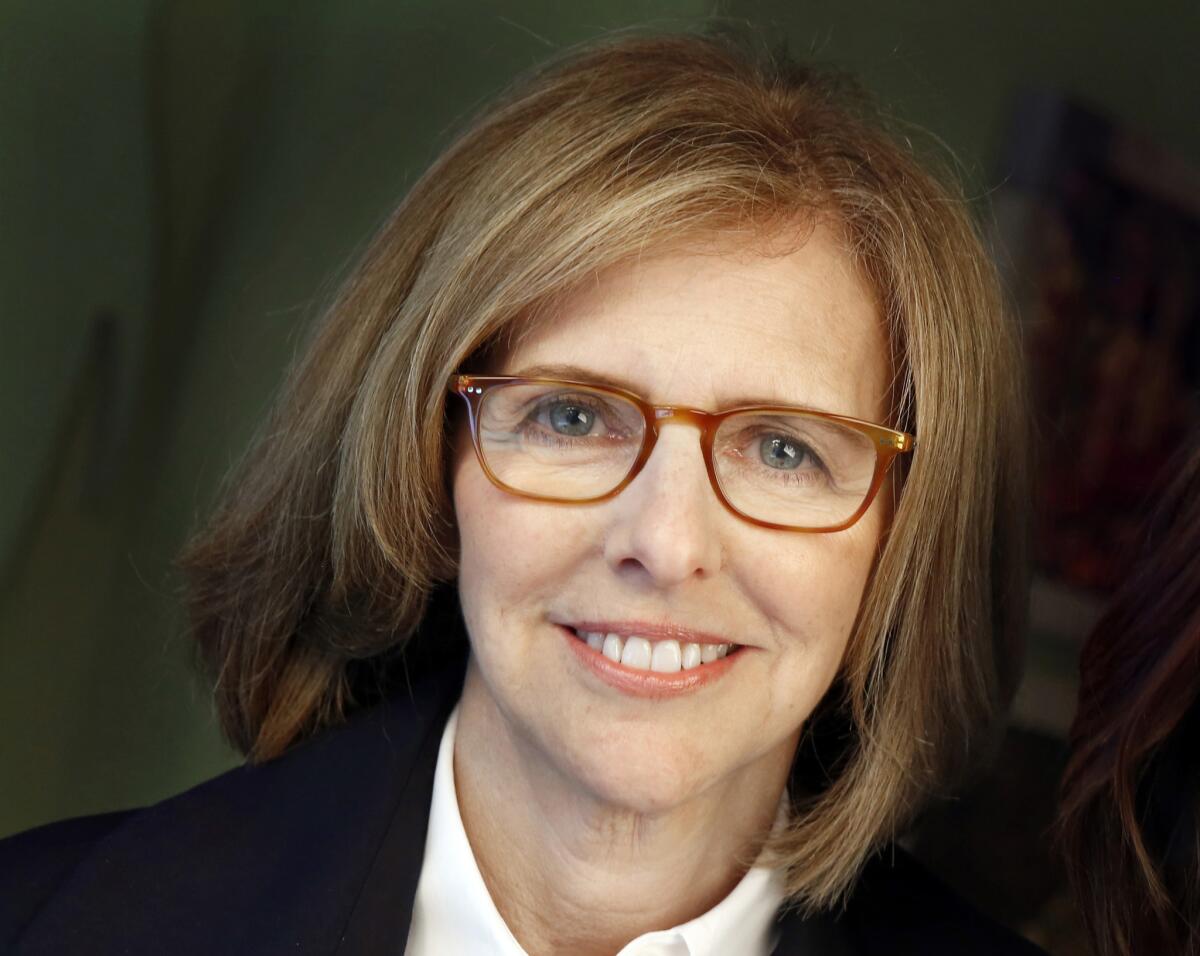‘Intern’ director Nancy Meyers reflects on changes for working women and in Hollywood

Writer-director Nancy Meyers in New York on Aug. 29, 2015.
Nancy Meyers was not allowed on the set of her first movie without a male chaperone. Thirteen films later — six of them as director — Meyers can laugh about it.
It was 1979 and Warner Bros was making “Private Benjamin” from a script Meyers had written with Charles Shyer, whom she would later marry. Her contract stipulated that Meyers, then 29, had to be with Shyer or with another male producer at all times while on set.
“I assumed it was because I was an inexperienced woman,” Meyers said. “It was a very male world. I didn’t know any women directors. I’m sure there were other women writers, but I didn’t know them. It was a bit isolating. There were pinups in the [crew] guys’ boxes. It made me really uncomfortable. I walked around and introduced myself. I said, ‘Hi, I’m the co-writer. I’d love if you would take that down.’”
SIGN UP for the free Indie Focus movies newsletter >>
Meyers’ latest movie as writer and director, “The Intern,” centers on a character who would find that chauvinist world unrecognizable in many ways. Jules, a young CEO of a tech startup played by Anne Hathaway, is the boss of 200 employees, responsible for the mortgage on a tastefully decorated Brooklyn brownstone, married to an attentive stay-at-home dad. And Jules has something Meyers says she never really did — a mentor, a 70-year-old retired businessman named Ben (Robert De Niro) who is improbably hired as her intern.
“It came from something that was missing in my life but I never thought of,” said Meyers, now 65. “When somebody’s in a stressful situation, wouldn’t it be nice to have someone with some wisdom to watch your back, remind you who you are and what you’re doing well? Wouldn’t we all like that?”
Meyers has an unusual, dichotomous quality — she takes the details of life and her movies utterly seriously while having a sense of humor about herself. Petite, crisply dressed at a busy Brentwood breakfast spot on a recent morning, she spied an Oscar-winning screenwriter across the room. “I’ll introduce you,” she said. “He’ll have no idea who I am.”
Asked if she could go back and offer her younger self a piece of advice, Meyers said, “I’d rather be able to talk to me now. I’d say, ‘Calm down.’”
As a female director of several successful studio movies, Meyers is the unofficial president of one of the world’s tiniest sororities. She has ridden out trends in the film business — many of them grim for the category of relationship-driven movie she makes — and watched as women in Hollywood have grown increasingly vocal about what they perceive as a second-class status.
For her fans, many of them female, Meyers’ tales of triumphant women in films like “It’s Complicated” and “Something’s Gotta Give” occupy event status. Mindy Kaling tweeted recently, “I’m going to see #TheIntern with my dad and I bet you a zillion dollars we both love it and also cry a little,” while Jezebel, Gawker’s female-driven blog, accompanies breathless posts about “The Intern” with a picture of the director wearing a tiny clip-art crown on her head.
Though Meyers’ movies have all been commercial successes, her audience is not typically an opening-weekend crowd. And film critics tend to be less charmed by them than moviegoers — the dismissive phrases “chick flick” and “middle-age porn” crop up in reviews. Meyers’ films dwell in an affluent, mostly white world and often touch off cultural discussions about gender and age.
“Nancy has an awareness that her position is somewhat unique,” said Suzanne Farwell, who started as Meyers’ assistant on her first film as a director, 1998’s “The Parent Trap,” and served as a producer on “The Intern.” “She’s always had a lot of clarity about what she wants, but now she has more confidence.”
Making “The Intern” tested that confidence, however, as Meyers found a film industry dramatically changed since the release of her last film, 2009’s “It’s Complicated.”
“Everybody was trying to make something else when I finished the script and sent it around,” Meyers said. “Everybody was trying to make ‘Spider-Man,’ so it hit the market not at the right time. ... I just kept taking more meetings and sending it out again. I got to the point where I was going to bury the script in my backyard. Dig a hole. Buy a nice little box at the Container Store. At a certain point I thought, ‘enough.’”
As Meyers worked to set up the film, cast members came and went — Reese Witherspoon and Tina Fey were both attached at one point. The kind of production budgets Meyers had worked with in the past, on films like “What Women Want,” which starred Mel Gibson, and “The Holiday” with Cameron Diaz and Kate Winslet, were no longer given to a movie without capes or visual effects. (“The Intern” cost about $40 million.)
“I knew that, and so I didn’t fight that,” Meyers said of the evolving Hollywood economics. “Things change. I’m sure there was a sense of, ‘Can she do it for this number?’ ‘Cause I’ve made a lot of movies that had really healthy budgets for movies that mostly take place in the kitchen and the bedroom.”
Ultimately Warner Bros. signed on and Meyers adjusted, shooting on fewer weeks than she was accustomed to and using real locations instead of building her famously detailed and lavish sets. She maintained some of her old habits — playing music on set, scrutinizing production design details, hiring a lot of women in below-the-line positions. (“We have male pinups,” Meyers joked.)
“It’s a comfort being one of the oldest people on the set now,” Meyers said. “I remember being one of the youngest and the only woman, and I didn’t like it.”
In many ways the themes Meyers explores in “The Intern” are more generational than gender-based. De Niro’s character is the one who can actually communicate, as the young adults around him struggle to choose the right emoticon for their feelings. The movie’s millennial men, in particular, are slump-shouldered boys compared to De Niro’s capable, well-groomed adult. When Ben asks, “Why doesn’t anybody tuck anything in anymore?” it’s easy to hear Meyers’ voice coming through.
“Older people have wisdom,” Meyers said. “Older people have value. The millennials are so big. They’re everywhere. That’s fantastic. You can’t open the paper without seeing who invented what and wow, he’s 23! But I’m not that far off from Bob [De Niro’s] age. These things are kind of personal. You’re just writing from your heart.”
Other scenes, including one that showcases the still-present tension between working and stay-at-home moms, are pulled directly from Meyers’ experience as a working mother of two.
“Of all the things that have happened to me in 35 years, why do I remember the mother who said me, ‘We’re having a fiesta at lunch tomorrow. Do you think you could bring the guacamole? You probably won’t have time to make it so you can buy some.’” Meyers asked. “I felt so judged. Of course I love to cook, and of course I can make guacamole, and of course I had time.”
It’s a scene that probably wouldn’t occur to a male writer, Meyers admitted.
“A lot of my women [characters], they come from me,” she said. “The things that worry me worry them. I feel a real responsibility when I write women.”
Twitter: @ThatRebecca
MORE:
Review: ‘The Intern’ is a Nancy Meyers comedy, for better or worse
Anne Hathaway, Nancy Meyers say ‘The Intern’ evolved from ‘Baby Boom’
Review: Weird ‘Finders Keepers,’ on bizarre fight over leg, actually turns heartfelt, poignant
More to Read
Only good movies
Get the Indie Focus newsletter, Mark Olsen's weekly guide to the world of cinema.
You may occasionally receive promotional content from the Los Angeles Times.











